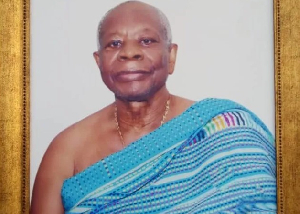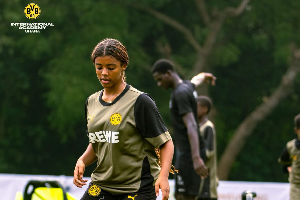A Tribute from the Achimota Trust UK on behalf of the Old Achimotan Association by Franklyn Ayensu
Mr Alan Rudwick, former headmaster of Achimota School, died on 18 December, 2009 on the Isle of Wight, UK. During his 12 years as headmaster, Mr Rudwick oversaw many important reforms. The Old Achimotan community pays him tribute in the following piece.
Alan Percival Rudwick—or just “Rudwick” to the thousands of students whose lives he helped shape during his 27 years at Achimota School—was one of the school’s longest-serving, most-admired and best-remembered headmasters.
That long association began offhandedly enough. He said that Alex Kwapong and Patrick Anin, two of his colleagues at Cambridge—later Vice Chancellor of the University of Ghana and a justice of the Supreme Court, respectively—urged him to consider going there to teach.
Mr Rudwick had heard about Achimota, vaguely. The Commonwealth Institute in fact had pic¬tures of the school on display at its offices in London. Still, the entire idea must have sounded a little exotic to the 23-year-old Englishman, at the time a final-year History student. Kwapong and Anin spoke so passionately about their former school, however, that he decided he would apply anyway. “They literally propelled me to,” he would later say.
As part of the process, Mr Rudwick had to travel to London to be interviewed by the Reverend Alexander G. Fraser. Not surprisingly, he arrived a nervous wreck. Most Achimotans would consider a one-on-one with Achimota’s legen¬dary first principal and co-founder as only slightly less holy than a private audi¬ence with the Pope. Mercifully, Fraser offered him the job on the spot: “Yes, young Rudwick, you’ll do very well at Achimota.” And that is how it all began.
In certain ways, Mr Rudwick’s time at Achimota paralleled the milestones of his own life: Born the same year the school opened—1927—he arrived there in 1951, just before he, like Achimota, turned 25. He retired at 50, just after the school’s own Golden Jubilee. Kwame Mfodwo, a former student who now teaches law at Monash University in Melbourne, Australia, notes that Mr Rudwick indeed helped to shape Achimota for almost half of Ghana’s independence era, steering the school through many of the fledgling nation’s successes, transitions, and challenges.
He moved up the ranks quickly at Achimota: History teacher, then Cadbury housemaster, then at 32 assistant headmaster. Then in 1965, just 38 years old, he was appointed the sixth headmaster, and ninth head, of the school. So completely did the Achimota community accept him that, two years later, in 1967, in a solemn and memorable tribal cere¬mony complete with palanquin, drumming, kente cloth, and sacred libations, he was enstooled as “Nana of Achimota” by the school and its alumni community. This gesture of full acceptance into Ghanaian culture so moved him that, in later years, he would fre¬quently make reference to it in conversation.
In his quiet but steady way, Mr Rudwick brought significant change to Achimota. His vision was to raise academic standards even higher than they were, and to modernise the facilities. Under him, roads were resurfaced, street lamps replaced, bathrooms upgraded, and electrical systems rewired. He guided the formation of Achimota’s Parent-Teacher Association and oversaw the expansion of the campus—already Ghana’s largest—to include the Western Compound. Dur¬ing General Acheampong’s Operation Feed Yourself program in the mid-70s, Achimota’s vastly expanded yam, corn and cassava plan¬tations fed not only the school but many a calorie-challenged Anumle villager grateful for the easy opportunity to raid the farms at night and help themselves.
Sprucing up school infrastructure is one thing; strengthening school spirit is another. This was the 1960s and ’70s, a time when the nation was gingerly working its way through the teething problems of self-government. Mr Rudwick, above all, wanted Achimota students to be confident and proud—proud of their school, their country, their culture, and themselves. Be¬yond the upgrading of buildings, he set himself the goal of restoring school spirit, concentrating on those intan¬gibles that constitute the character of any great academic institution and infuse its atmos¬phere.
To cultivate these, he promoted a dazzling array of extracurricular activities—the Current Affairs Club. The Debate Society. The French Club. The Achimotan magazine. The Red Cross. The Cadet Corps. The Boy Scouts. The school orchestra. Afternoons and weekends at Achimota simply buzzed with activity. He revamped the Art School and arranged for the works of students such as Ato Delaquis and Sam Bentil, both now acclaimed international artists, to go on exhibit in the Administration Block. On Sundays, the Science Theatre showed documentaries on a range of topics to jam-packed audiences who paid little attention to the stuffy ventilation.
Achimota’s annual Festival of Nine Lessons and Carols became a much-anticipated date on Accra’s cultural calendar. Under the expert direction of John Barham, the carol service drew thousands from the city, often compelling repeat per¬formances. And every other year or so, it seemed, the school would stage a Gilbert and Sullivan opera, with staff and students playing both lead and support roles.
Although all of this may look like high culture, Mr Rudwick had none of the high-brow air sometimes associated with an Oxbridge background. He wanted his students to be Ghanaians and insisted that we embrace cultural traditions, the spirit of service, and even manual labour as integral parts of a well-balanced life. And so in the real spirit of Achimota, children of ministers and ambassadors scrubbed, swept, hoed, and polished side by side with children of small-hold farmers.
Under Mr Rudwick, the great sports rivalry between Nigeria’s Kings College and Achimota—in cricket, hockey, soccer, swimming and track and field—flourished. So did the Triangular Athletic Games, matching Adisadel, Holy Child, Mfantsipim, Wesley Girls and Achimota against one another in a contest of wills and testosterone. He initiated the Inter-House Singing Competition and the annual Gardening Competition, pushing the houses into friendly rivalries that could get quite heated. Indeed, it was not entirely unknown for fresh-cut stems of bougainvillea, frangipani and heliconia to sprout up overnight—like mysterious crop circles—in the flower beds surrounding a Lugard or a Livingstone House, just hours before the judges walked in.
The ruse never worked. Almost invariably, the competition would be won by Cadbury, with its terrific rock garden fanatically nurtured by the late Adrian “Terror” Sherwood, Achimota’s legendary English teacher of the 1960s and ’70s—himself an amateur horticulturalist, much like the Rudwicks.
Although outwardly reserved, Mr Rudwick sought out personal relationships with students, and he and his wife Ann, a paediatrician, often invited Sixth Formers to their home for lunch. In an initiative perhaps unprecedented at the school, he even encouraged a few students to try their hand at teaching. Audrey Quaye, a financial analyst and consultant based in the US, recalls for example that, while teaching the General Paper course to Lower Sixth Formers, Mr Rudwick invited Nkrabeah Effah-Dartey, then in Upper Sixth, to teach the current affairs sessions on the Vietnam War.
When he realized that Joris Wartenberg was a budding playwright, he promoted him, staging his full-length multi-act play, The Ghost’s Revenge, on the capacious grounds of the Headmaster’s Residence. The play was produced, directed and performed by the students themselves. Wartenberg would later create Osofo Dadzie, Ghana television’s longest-running and most successful sitcom.
When the British Council showed Jacob Bronowski’s groundbreaking documentary series The Ascent of Man, Mr Rudwick was so excited that he made a special bus available for a number of us to leave school on Saturday evenings—without exeat, mind you—to attend the entire 13-part BBC series in the Council’s air-conditioned auditorium in Accra. Now that was a real treat. The no-exeat part, especially, made us feel grownup and trusted.
These examples of vibrant and inclusive school life, which transcended boundaries of race, class and culture, are partly what Mr Rudwick meant by reviving the old Achimota spirit. In part because of the Rudwicks, many students left Achimota carrying a new sense of ex¬tended family with them, convinced that, despite the challenges, blacks and whites could work side by side to promote progress. This was the dream Achimota’s founders had dared to dream half a century earlier, when they chose the black and white keys of the piano as a symbol for the school crest.
Achimota’s sixth headmaster could on occasion be a stickler for order. If you saw his bespectacled form coming down one of the hallways, with that characteristic forward-leaning gait and the slight paunch and close-cropped beard, you instinctively adjusted your belt buckle and run your finger along your shirt buttons to make sure they were all done. Because he would check. Just a month ago, a chance visit to the BBC website revealed that the man had not changed one bit: Down there in the Comments Section, in 2007, he had chided the BBC Symphony Orchestra for the unseemly casualness of its dress code—especially the conductor— and the “dreary” black they had worn for a performance of Beethoven’s Seventh.
Despite his attention to form, he took a genuine, even informal, interest in many students, and he would personally intervene in their lives if he sensed they were in real difficulty. He and Ann even arranged for a student to receive emergency surgery overseas; she recovered well and went on to excel in her career. Former senior prefect James Dormon, a US-based architect and project manager, recalls:
Besides being an excellent manager, Nana Rudwick was a generous man. When it came to students he saw the total picture, and from a perspective that often differed from that of some of his staff. On several occasions he blocked the recommendation of a suspension because he felt the punishment did not quite fit the crime. I personally know that he helped to work out bursary schol¬arships for several underprivileged students struggling to pay their fees, preferring that they not be sent home. Many Old Achimotans who are successful today may not even be aware of the tussles that he had with the Bur¬sar’s Office on their behalf, so that they could continue their studies uninterrupted.
By the mid-1970s, however, there were signs of a sea change. The national education budget was tightening, and schools were being asked to do more with less. When Achimota celebrated its Golden Jubilee in 1977—with HRH Charles, the Prince of Wales and President Sir Dauda Jawara of The Gambia (himself an Old Achimotan) in attendance—Nana Rudwick gave his final speech. For his service to Ghanaian education, he received the Grand Medal of Ghana. Later the same year, he was awarded the Order of the British Empire (OBE) by HM Queen Elizabeth II.
The Rudwicks spent the next eight years enjoying the balmy Mediterranean weather of Jávea, on Spain’s Costa Blanca coastline. “You must come and visit us!” he would often say before they departed. It is not known if any of us ever took him up on it. Did we still see him as “headmaster”?
In 1983, the couple moved back to England. He became the Royal Commonwealth Society’s membership secretary; she joined the Community Child Health Department. Both positions were ideal for staying in touch with Old Achimotans living in or passing through London, as were the alumni reunions they attended in London and the United States.
For many former students, by then in their late 20s to mid-40s, it was almost surreal to relate on an equal basis to a headmaster who had once virtually wielded plenipotentiary powers over your very soul when you still had pimples. As unsettling as this feeling of parity was, it captured in a simple way the truth that pre¬paring boys and girls to take their place in society is what education, after all, is all about.
In 1994 the Rudwicks, now both retired, moved south to the cosy Isle of Wight. Even with his health declining, when a group of Old Achimotans known as AC2010 approached him in 2006 and asked if he would assist with an ambitious new capital campaign for the school, he did not hesitate to lend his weight as a honorary co-chairperson.
Although his health during the final years kept him from attending the OAA meetings in London, reliable sources confirm that he always made sure Ann brought back sizeable “care packages” of aponkyenam, abenkwan, nkatsenkwan and dodokyi. One former Deputy Senior Prefect remembers that Mr Rudwick sometimes would invite himself, unannounced, to the Prefects High Table on the West—but only on Wednesdays, when nkatsenkwan (peanut soup) was being served. He came, no doubt, for the stimulating conversation and keen updates about school affairs, and only incidentally for the meal.
He denied remembering any of this but did confess to setting one record that surely must still stand: No faculty member in Achimota’s history has consumed more dodokyi (fried plantain) in one sitting than he has, nor perhaps over a lifetime.
Nana Rudwick’s title as a Ghanaian chief was, after all, more than skin-deep.
A great tree has fallen. In the early hours of 18 December, 2009, Nana Akora Alan Rudwick, the Cambridge student who took a chance and purchased a one-way ticket to Accra in 1951, passed away in Ryde, Isle of Wight. He was 82. Achimotans everywhere will miss him.
It would be fitting to end with a eulogy that speaks on behalf of all Old Achimotans, a tribute from a former student who withheld her name in order to make it an homage from all:
Nana Alan Rudwick, thank you for inspiring a whole generation of Ghanaians! Thank you for creating an intellectually and culturally vibrant campus that en¬sured a well-rounded education for us! Thank you for promoting the arts and music at our great school! Thank you for encouraging concern and financial support for those less fortunate among us! Thank you for recognizing the value of positive input from parents and helping to establish the PTA! Thank you for laying a foundation of success for so many Ghanaian professionals, both in Ghana and abroad! Akoras and Ghanaians thank you!
Damirifa due! Ya wo odzogban; Nuntso le akwe ono!
Funeral services were held at All Saints Church in Ryde on 11 January, 2010. There will be a memorial service in Aggrey Chapel, Achimota School on 31 January. Plans for memorial services in the UK and the US will be announced shortly. Nana Rudwick’s widow, Ann, requests that donations, if desired, be made out to The Achimota Trust, with a note saying “In memory of Alan Rudwick.” The donations can be made either online at www.achimotatrust.org, or mailed to 4 Cranfield Drive, London, NW9 5WH, UK. You may also contact Mr. Ken Agra, Achimota Trust, at k.agra@sky.com.
The author is indebted to the many other Old Achimotans who offered useful suggestions and comments during the preparation of this tribute, which is based in part on a biographical sketch received from Mr Rudwick.
Opinions of Sunday, 24 January 2010
Columnist: Ayensu, Franklyn














